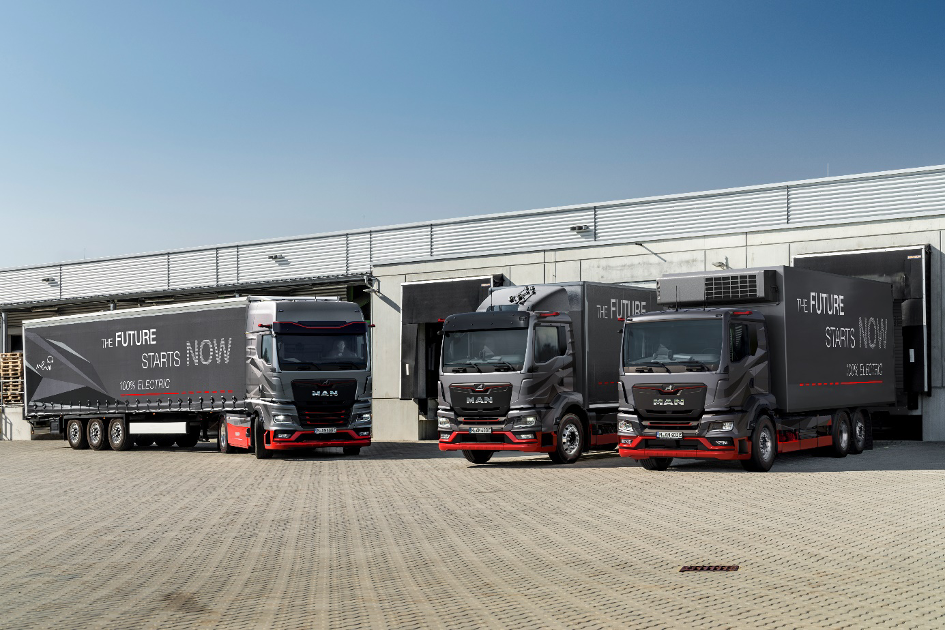Electrification of heavy-duty transport: SPIRIT-E develops intelligent and bidirectional charging solutions
The European Commission’s latest proposal is ambitious: CO2 emissions from heavy-duty vehicles are to be reduced by 90% by 2040 [1]. Battery-electric trucks are currently emerging as the most suitable solution. Together with partners from industry and science, SBRS is researching and developing in practical real-world laboratories how bidirectional charging and a reservable private charging infrastructure can be successfully integrated into existing energy systems and networks and thus succeed in the sector coupling of the energy and transport sectors.
In European road transport, commercial vehicles are responsible for about 38% of greenhouse gas emissions [2]. Electrification of commercial vehicles with battery technology offers the greatest potential for sustainable emission reduction. However, the envisaged technology transition poses major challenges for both vehicle manufacturers (OEMs) and freight forwarders: High cost pressure coupled with high demands on payload, range and efficiency are limiting factors. For the efficient operation of the vehicles, driving and rest breaks as well as general idle times for intermediate charging are suitable. This requires a well-developed and flexibly accessible charging infrastructure (LIS) with high charging capacities (> 500 kW), which, however, is currently almost unavailable. In the case of public LIS, the long process times during construction and the lack of space along the main logistics axes or motorways make things even more difficult.
In SPIRIT-E’s real-world laboratories, charging infrastructure is being researched in an application-oriented manner and for sustainable commercial vehicle transport.
The aim of the SPIRIT-E research project is to identify the existing hurdles in the electrification of heavy-duty transport and to develop practice-oriented solutions. To this end, real-world laboratories will be set up at two logistics locations and development results will be tested in their practical suitability. The project pursues the promising solution of making the private charging infrastructure at logistics locations available to external freight forwarders and their vehicles. By making reservations for the individual charging points, the shared charging infrastructure is applied. In order to integrate commercial vehicles into the local energy system and, more generally, into the power grid, bidirectional charging is also being implemented, opening up potential for innovative energy-related applications. This requires a wide range of innovations in the areas of vehicle technology, charging hardware, (bidirectional) charging and energy management, as well as communication interfaces between all parties involved.
Bidirectional charging opens up new possibilities for the coupling of the energy and transport sectors.
Due to the availability of private charging points for external heavy commercial vehicles, freight forwarders and depot operators achieve a higher utilization of their LIS. Sharing avoids bottlenecks, uses resources efficiently, and refinances the operator’s investments faster. In order to ensure reliable planning of charging points and power capacities, a digital reservation system is being developed and tested in the real-world laboratory. In operation, both own and third-party vehicles reserve charging points and ensure smooth processes and fair distribution of resources, both in the logistics depot and in the public charging network.
The bidirectional charging function also opens up new energy-related applications by feeding surplus energy back into the grid and marketing the vehicle storage system. This leads to new business models and significant cost advantages for depot operators. In addition, load peaks at the logistics site can be reduced, especially with regard to renewable energies, and loading and unloading can be operated in a way that serves the system and the grid. For smooth operation, relevant information must be exchanged confidently between the market players involved. Therefore, data spaces will be integrated into SPIRIT-E to ensure a coupling of energy and transport sector data.
This is associated with intelligent grid and system integration into existing power grids: The energy system is facing enormous challenges with the transition to many decentralised generation units of lower output and the elimination of central power plants in the multi-digit MW power range. Ancillary services such as frequency maintenance or congestion management are increasingly coming from new sources of flexibility due to the increasing feed-in of volatile energy sources. In addition to grid expansion, new processes, IT systems and standardised interfaces must therefore be defined and developed in order to integrate the new decentralised consumption facilities.
About SPIRIT-E
The SPIRIT-E research project is a joint research project of leading companies and research institutions and started in August 2023. It is funded by the German Federal Ministry for Economic Affairs and Climate Action for a period of three years as part of the “Accompanying Research on Electric Vehicles” funding programme. The project executing agency is the German Aerospace Center DLR-PT. As part of the project, real-world laboratories will be set up at two logistics locations and innovations will be developed and tested. Thanks to the wide range of partners involved, the Technical University of Munich (consortium leader and accompanying research on operational strategy), MAN Truck and Bus SE (bidirectional e-trucks and fleet charging management), Forschungsstelle für Energiewirtschaft e.V. (accompanying research on energy industry integration), SBRS GmbH (development of bidirectional charging hardware), Fraunhofer Institute for Energy Systems and Energy Economics (aggregation control system and data exchange), Hubject GmbH (roaming, plug and Charge (PnC) and reservation system), Consolinno Energy GmbH (flexibility data aggregation and measurement data) and TenneT (ancillary services), the entire ecosystem of transport electrification is covered and a holistic and practical approach is ensured. SPIRIT-E is thus a significant step towards an environmentally friendly and sustainable future for commercial vehicle transport.







